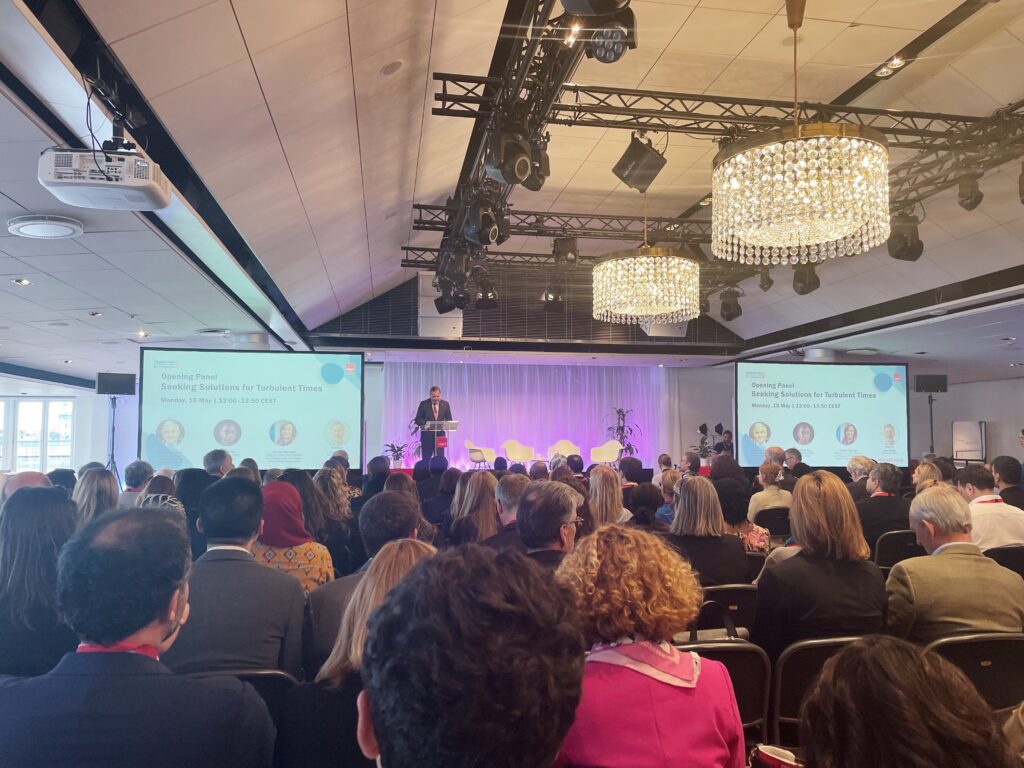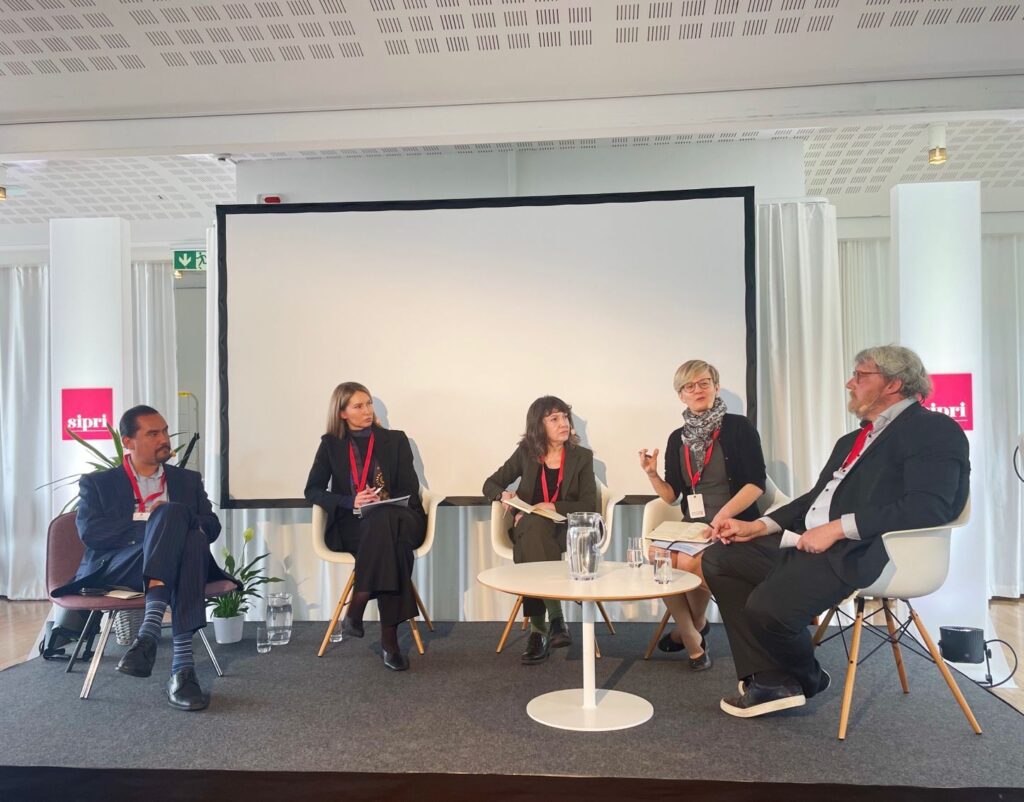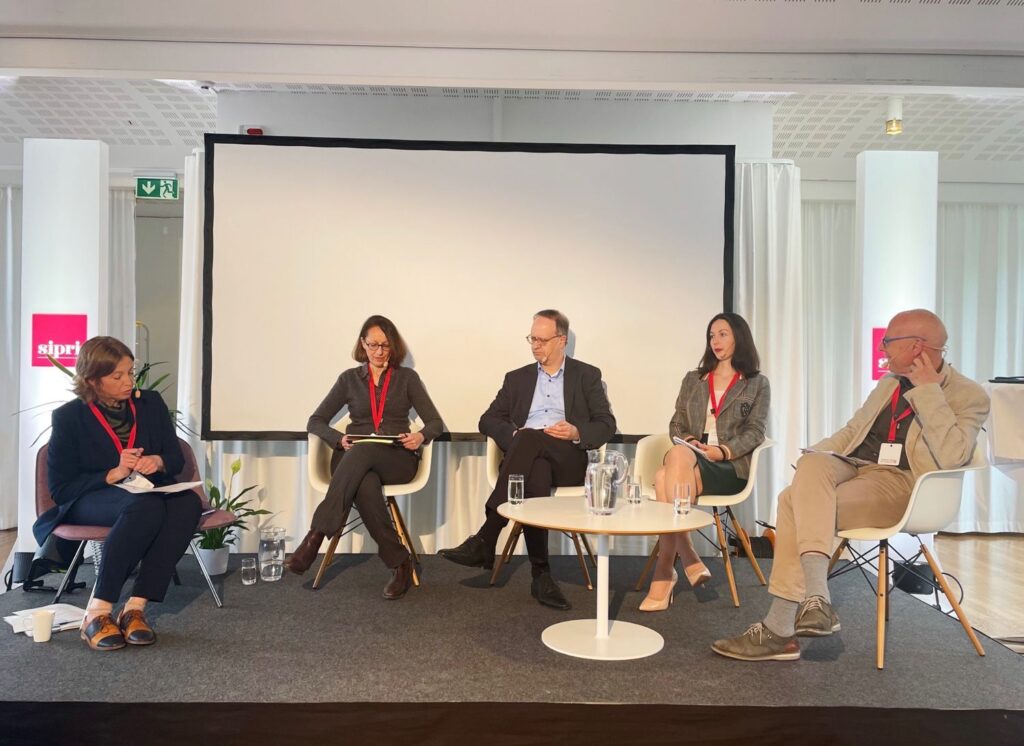Exploring approaches to peace in turbulent times
CMI took part in SIPRI’s 2023 Forum on Peace and Development, which gathered over 300 participants from 56 countries and 40 organisations in Stockholm for three days. This year’s topic ‘Seeking Solutions for Turbulent Times’ sought to tackle a complex reality, exploring how the war in Ukraine, other armed conflicts and the geopolitical transformation, as well as crises such as climate change and food security are shaping the way in which peace should be approached.

The Forum’s opening words were delivered by Stefan Löfven, Chair of the SIPRI Governing Board and former Prime Minister of Sweden.
The 2023 Forum, organised by the Stockholm International Peace Institute (SIPRI), was guided by the timely theme ‘Seeking Solutions for Turbulent Times’. As geopolitical tensions are on the rise, with 56 countries across the globe dealing with various types of conflict, peacemaking, peacebuilding and stabilisation are more important than ever. However, this is becoming increasingly complex, with new actors competing on the global scene, climate change, food insecurity, global health challenges, and many other determining factors deeming previously used strategies to be outdated and inadequate.
CMI organised two panels during the Forum, one on Ukraine and Just Peace and one on EU Enlargement and Peacemaking, and contributed to a panel on the geopolitical impacts of the war in Ukraine in the MENA region.
Inclusivity is key on Ukraine’s path towards peace
CMI’s first panel reflected on the situation and developments of the Russian invasion in Ukraine, and explored practical steps for achieving a ‘comprehensive, just and lasting peace’ as agreed in the United Nations General Assembly Resolution adopted on 23 February 2023, calling for an end to the war in Ukraine and demanding Russia’s immediate withdrawal from the country, in line with the UN Charter. The session was guided by questions such as when and under what conditions comprehensive talks between Ukraine and Russia can start to end the war, and what the key factors are that could enable the talks between parties as well as multilaterally.
Panelists included CMI’s Chief Programme Officer, Ville Brummer; Advisor to the Minister of Defence of Ukraine Yuna Potomkina; Program Director for Europe and Central Asia at International Crisis Group, Olga Oliker; and Associate Professor at the Kyiv-Mohyla Academy and Senior Fellow at Swisspeace, Tetiana Kyselova. The panel was moderated by Senior Advisor, CMI Eurasia team, Denis Matveev.
The discussion highlighted the importance of having a long-term vision and the need for sufficient inclusion of civil society in various processes as a key factor on the path towards sustainable peace.
The topic of Ukraine was also discussed in a panel where Head of CMI MENA Team Maruan El-Krekshi took part, focusing on the effects of the Russian-Ukrainian conflict in the MENA region. The discussion provided a vast outlook on how dynamics in the region have changed both in the region itself, as well as between the region and major powers. The discussion highlighted that while most countries in the region condemn the Russian invasion of Ukraine, each country has its own interests and positioning in relation to the conflict and its parties. The need for increased inclusivity in the shaping of security policy interests and architecture in the region was accentuated during the exchange.

From left to right: Senior Advisor, CMI Eurasia Team, Denis Matveev; Advisor to the Minister of Defence of Ukraine Yuna Potomkina; Program Director for Europe and Central Asia at International Crisis Group, Olga Oliker; Associate Professor at the Kyiv-Mohyla Academy and Senior Fellow at Swisspeace, Tetiana Kyselova and CMI’s Chief Programme Officer, Ville Brummer.
EU enlargement – a carrot or a stick for peacemaking?
The second CMI-hosted panel by the title: ‘EU Enlargement and Peacemaking: Lessons Learnt and Ongoing Processes’ looked closer at the interlinkages between EU enlargement and peacemaking.
As the EU embarks on a new enlargement phase, including a set of countries with internal cohesion and resilience challenges, questions were asked about when EU enlargement has worked as an incentive for advancing peace processes, and reversely, when it worked as a disincentive. How successful is the EU in carrying forward its positive peace agenda throughout accession processes? And what are the key factors for conflict sensitive EU policies and processes with a view of ensuring that EU enlargement reinforces peace making?
Panelists included Senior Policy Analyst at the European Parliamentary Research Service, Isabelle Ioannides; Senior Researcher at the German Institute for International and Security Affairs (SWP) in Berlin, Günter Seufert; Research Fellow at the New Europe Center in Kyiv, Marianna Fakhurdinova; and Senior Associate of the Democratization Policy Council, Bodo Weber. The panel was moderated by Head of CMI’s Brussels Office, Jibecke Joensson.
By zooming in on multiple case studies in the EU neighbourhood, the speakers provided insights on the extent to which enlargement and peacemaking could be mutually re-enforcing processes, where they have not been, and how they could affect each other in a constructive manner. The discussion highlighted the importance of contextual differences, situational awareness, and transparency as well as accountability.

From left to right: Head of CMI’s Brussels Office, Jibecke Joensson; Senior Policy Analyst at the European Parliamentary Research Service, Isabelle Ioannides; Senior Associate of the Democratization Policy Council, Bodo Weber; Research Fellow at the New Europe Center in Kyiv, Marianna Fakhurdinova and Senior Researcher at the German Institute for International and Security Affairs (SWP) in Berlin, Günter Seufert.
The discussion raised some key aspects to consider for peacemaking, as the EU moves ahead with potential enlargement both with already ongoing processes and with processes which are just starting. These include: restoring the credibility of EU enlargement as a tool, maintaining honesty and managing expectations during the process, maintaining situational awareness, involving civil society further and in a more substantive manner, and leading with a comprehensive and long term-vision. Jibecke Joensson stressed the fundamental differences that come with the current enlargement process for the EU as a global peace mediation actor, and for the European security architecture, and thus the importance to unpack the many different layers in order to get it right; “the EU was set up to ensure and build peace between and within its members, not to defend itself against non-members”.
***
Although, as per the theme of the 2023 SIPRI Forum, times are indeed turbulent, the conference shined light on how cooperation and long-term vision on global, regional and local levels can help alleviate the challenges we will be facing in the coming years. In the current geopolitical climate, which affects both Europe and the world, such discussions are increasingly valuable. As Denis Matveev stated, “CMI will continue to bring together counterparts for more honest conversations to produce clearer visions for the future, and to fill in the gaps moving forward.”
Photos and article: Melis Yasat / CMI